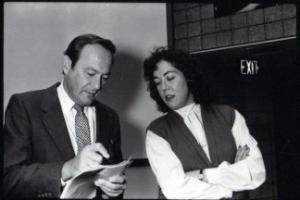Dr. Robert Newman died earlier this month after being struck by an automobile earlier this summer. He was 80 years old.

While he did not achieve the goal of providing treatment to everyone who wanted it, Newman oversaw the rapid expansion of the city's fledgling methadone program in the early 1970s. The number of patients on methadone went from a handful to more than 10,000 in two years, and 35,000 by 1975.
And he stood up for those patients. When the NYPD wanted Newman to turn over patients' methadone records, he refused. Instead, he took to the courts to defend his patients' right to privacy -- and he won.
After that, he devoted his career to advocating for evidence-based treatment, traveling the country and the world and picking up a second moniker, "the methadone pope," as he advanced harm reduction ideas decades before they became popularized.
He faced opposition from abstinence and 12-step proponents, as well as from elected officials like New York City Mayor Rudy Giuliani, who in 1998 tried to shut down the city's methadone program on the moralistic grounds that it merely substituted one addiction for another. The diplomatic Newman didn't challenge Giuliani head on but instead used interviews to make his case that methadone treatment allowed addicts to lead productive lives.
Newman also advocated for a humane approach toward addicted mothers and pregnant women, supporting groups such as National Advocates for Pregnant Women in their fight against the demonization and criminalization of those women. He was a drug policy reformer who served for decades on the board of the Drug Policy Foundation and then its successor the Drug Policy Alliance.
As this century's opioid epidemic deepened, Newman was cautiously optimistic that the work he had begun decades earlier would help further destigmatize addiction. "I'm hoping that pragmatism will win out," he said. "As more and more Congresspeople, people in the general community and physicians have children who develop a problem with prescription drug use and can't get treatment for it, I think it will make people more receptive to opening doors to treatment."
Newman was not only an influential physician in addiction issues, he was a giant in the hospital world as a whole. He served as President of Beth Israel Medical Center in New York, and then of the entity that acquired Beth Israel along with other facilities -- and then of the entity that acquired that entity. But one could still talk him at a drug policy conference, or send him an email, and you'd get an email back.
Dr. Robert Newman's contribution to an enlightened approach to addiction cannot be overstated. He will be missed, but his legacy lives on.
(Read Bob Newman's 1998 interview with this newsletter here.)
This work by StoptheDrugWar.org is licensed under Creative Commons Attribution-ShareAlike 4.0 International
Add new comment